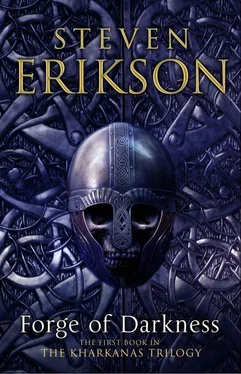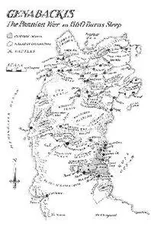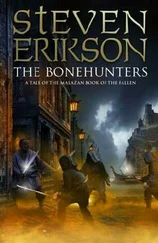Steven Erikson - Forge of Darkness
Здесь есть возможность читать онлайн «Steven Erikson - Forge of Darkness» весь текст электронной книги совершенно бесплатно (целиком полную версию без сокращений). В некоторых случаях можно слушать аудио, скачать через торрент в формате fb2 и присутствует краткое содержание. Жанр: Фэнтези, на английском языке. Описание произведения, (предисловие) а так же отзывы посетителей доступны на портале библиотеки ЛибКат.
- Название:Forge of Darkness
- Автор:
- Жанр:
- Год:неизвестен
- ISBN:нет данных
- Рейтинг книги:3 / 5. Голосов: 1
-
Избранное:Добавить в избранное
- Отзывы:
-
Ваша оценка:
- 60
- 1
- 2
- 3
- 4
- 5
Forge of Darkness: краткое содержание, описание и аннотация
Предлагаем к чтению аннотацию, описание, краткое содержание или предисловие (зависит от того, что написал сам автор книги «Forge of Darkness»). Если вы не нашли необходимую информацию о книге — напишите в комментариях, мы постараемся отыскать её.
Forge of Darkness — читать онлайн бесплатно полную книгу (весь текст) целиком
Ниже представлен текст книги, разбитый по страницам. Система сохранения места последней прочитанной страницы, позволяет с удобством читать онлайн бесплатно книгу «Forge of Darkness», без необходимости каждый раз заново искать на чём Вы остановились. Поставьте закладку, и сможете в любой момент перейти на страницу, на которой закончили чтение.
Интервал:
Закладка:
There had been three huts on this narrow trail. Now they were heaps of ash, muddy grey and dull white and smeared black. One of the huts had belonged to a daughter, old enough to fashion a home of her own, but if she had shared it with a husband his body was nowhere to be seen, while she was lying half out of what had probably been the doorway. The fire had eaten her lower body and swollen the rest, cooking it until the skin split and here the gods sat still, as if in shock, in slivers of lurid red and patches of peeled black. Her long hair had been thrown forward, over the top of her head. Parts of it had burned, curling into fragile white nests. The rest was motionless midnight, with hints of reflected blue, like rainbows on oil. She was, mercifully, lying face down. One rupture upon her back was different, larger, and where the others had burst outward this one pushed inward. A sword had done that.
The body directly before him, however, was that of a child. The blue of the eyes was now covered in a milky film, giving it its only depth, since all that was behind that veil was flat, like iron shields or silver coins, sealed and deprived of all promise. They were, he told himself yet again, eyes that no longer worked, and the loss of that was beyond comprehension.
He would paint this child’s face. He would paint it a thousand times. Ten thousand. He would offer the paintings as gifts to every man and every woman of the realm. And each time any one man or woman stirred awake the hearth gods of anger and hate, feeding the gaping mouth of violence and uttering pathetic lies about making things better, or right, or pure, or safe, he would give them yet another copy of this child’s face. He would spend a lifetime upon this one image, repeated in plaster on walls, on boards of sanded wood, in the threads of tapestry; glazed upon the sides of pots and carved on stones and from stone. He would make it one argument to defy every other god, every other venal emotion or dark, savage desire.
Kadaspala stared down at the child’s face. There was dirt on one cheek but otherwise the skin was clean and pure. Apart from the eyes, the only discordant detail was the angle between the head and the body, which denoted a snapped neck. And bruising upon one ankle, where the killer had gripped it when whipping the boy in the air — hard enough to separate the bones of the spine.
The gods of colour brushed lightly upon that face, in tender sorrow, in timorous disbelief. They brushed light as a mother’s tears.
The fingers of his right hand, folded over the saddle horn, made small motions, painting the boy’s face, filling the lines and planes with muted colour and shade, working round the judgement-less eyes, saving those for last. His fingers made the hair a dark smudge, because it was unimportant apart from the bits of twig, bark and leaf in it. His fingers worked, while his mind howled until the howling fell away and he heard his own calm voice.
‘Denier Child… so I call it. Yes, the likeness is undeniable — you knew him? Of course you did. You all know him. He’s what falls to the wayside in your triumphant march. Yes, I kneel now in the gutter, because the view is one of details — nothing else, just details. Do you like it?
‘ Do you like this?
‘ The gods of colour offer this without judgement. In return, it is for you to judge. This is the dialogue of our lives.
‘ Of course I speak only of craftsmanship. Would I challenge your choices, your beliefs, the way you live and the things you desire and the cost of those things? Are the lines sure? Are the colours true? What of those veils on the eyes — have you seen their likeness before? Judge only my skill, my feeble efforts in imbuing a dead thing with life using dead things — dead paints, dead brushes, dead surface, with naught but my fingers and my eyes living, together striving to capture truth.
‘ I choose to paint death, yes, and you ask why — in horror and revulsion, you ask why? I choose to paint death, my friend, because life is too hard to bear. But it’s just a face, dead paints on dead surface, and it tells nothing of how the neck snapped, or the wrongness of that angle with the body. It is, in truth, a failure.
‘ And each time I paint this boy, I fail.
‘ I fail when you turn away. I fail when you walk past. I fail when you shout at me about the beautiful things of the world, and why didn’t I paint those? I fail when you cease to care, and when you cease to care, we all fail. I fail, then, in order to welcome you to what we share.
‘ This face? This failure? It is recognition.’
There were other corpses. A man and a woman, their backs cut and stabbed as they sought to hold their bodies protectively over those children they could reach, not that it had helped, since those children had been dragged out and killed. A dog was stretched out, cut in half just above the hips, the hind limbs lying one way, the fore limbs and head the opposite way. Its eyes, too, were flat.
When travelling through the forest, Kadaspala was in the habit of leaving the main track, of finding these lesser paths that took him through small camps such as this one. He had shared meals with the quiet forest people, the Deniers, although they denied nothing of value that he could see. They lived in familiarity and in love, and wry percipience and wise humility, and they made art that took Kadaspala’s breath away.
The figurines, the masks, the beadwork — all lost in the burnt huts now.
Someone had carved a wavy line on the chest of the dead boy. It seemed that worship of the river god was a death sentence now.
He would not bury these dead. He would leave them lying where they were. Offered to the earth and the small scavengers that would take them away, bit by bit, until the fading of flesh and memory were one.
He painted with his fingers, setting in his mind where all the bodies were lying in relation to one another; and the huts and the dead dog, and how the sun’s light struggled through the smoke to make every detail scream.
Then, kicking his mule forward, he watched as the beast daintily stepped over the boy’s body, and for the briefest of moments hid every detail in shadow.
In the world of night promised by Mother Dark, so much would remain for ever unseen. He began to wonder if that would be a mercy. He began to wonder if this was the secret of her promised blessing to all her believers, her children. Darkness now and for evermore. So we can get on with things.
A score or more horses had taken the trail he was now on. The killers were moving westward. He might well meet them if they had camped to rest from their night of slaughter. They might well murder him, or just feed him.
Kadaspala did not care. He had ten thousand faces in his head, and they were all the same. The memory of Enesdia seemed far away now. If he was spared, he would ride for her, desperate with need. For the beauty he dared not paint, for the love he dared not confess. She was where the gods of colour gathered all the glory in their possession. She was where he would find the rebirth of his faith.
Every artist was haunted by lies. Every artist fought to find truths. Every artist failed. Some turned back, embracing those comforting lies. Others took their own lives in despair. Still others drank themselves into the barrow, or poisoned everyone who drew near enough to touch, to wound. Some simply gave up, and wasted away in obscurity. A few discovered their own mediocrity, and this was the cruellest discovery of all. None found their way to the truths.
If he lived a handful of breaths from this moment, or if he lived a hundred thousand years, he would fight — for something, a truth, that he could not even name. It was, perhaps, the god behind the gods of colour. The god that offered both creation and recognition, that set forth the laws of substance and comprehension, of outside and inside and the difference between the two.
Читать дальшеИнтервал:
Закладка:
Похожие книги на «Forge of Darkness»
Представляем Вашему вниманию похожие книги на «Forge of Darkness» списком для выбора. Мы отобрали схожую по названию и смыслу литературу в надежде предоставить читателям больше вариантов отыскать новые, интересные, ещё непрочитанные произведения.
Обсуждение, отзывы о книге «Forge of Darkness» и просто собственные мнения читателей. Оставьте ваши комментарии, напишите, что Вы думаете о произведении, его смысле или главных героях. Укажите что конкретно понравилось, а что нет, и почему Вы так считаете.












